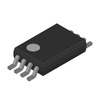Manufacturer Part Number
P2040NSE7MMC
Manufacturer
NXP Semiconductors
Introduction
The P2040NSE7MMC is part of NXP Semiconductors' QorIQ P2 series of embedded microprocessors designed for high-performance computing needs in networking, telecommunications, and industrial applications. It integrates four 32-bit PowerPC e500mc cores running at 1.2GHz.
Product Features and Performance
Four 32-Bit PowerPC e500mc cores
Speed of 1.2GHz
Co-Processors/DSP for security: SEC 4.2
Memory support includes: DDR3, DDR3L RAM controllers
Includes 5 Ethernet ports supporting 10/100/1000Mbps
2 SATA 3Gbps interfaces
2 USB 2.0 ports with PHY
Multiple voltage I/O support: 1.0V, 1.35V, 1.5V, 1.8V, 2.5V, 3.3V
Designed for operation in temperatures ranging from 0°C to 105°C (TA)
Product Advantages
Scalable multi-core performance
Integrated security features including boot security, cryptography, and a random number generator
Broad interface support enhances system design flexibility
Supports both high-speed networking and storage
Operates reliably in a wide range of temperatures
Key Technical Parameters
Core Processor: PowerPC e500mc
Number of Cores/Bus Width: 4 Core, 32-Bit
Speed: 1.2GHz
RAM Controllers: DDR3, DDR3L
Ethernet: 10/100/1000Mbps (5)
SATA: SATA 3Gbps (2)
USB: USB 2.0 + PHY (2)
Operating Temperature: 0°C ~ 105°C (TA)
Quality and Safety Features
Enhanced security features for data protection
High-temperature operational range ensuring reliability in challenging environments
Compatibility
Offers broad support for various memory types and I/O interfaces, facilitating easy integration into existing systems
Application Areas
Networking equipment
Telecommunications infrastructure
Industrial control systems
Product Lifecycle
Product Status: Obsolete
As an obsolete product, planning for future replacements or upgrades is essential
Several Key Reasons to Choose This Product
High computing power with four 32-bit cores and 1.2GHz speed
Enhanced security for data protection and system integrity
Versatility in interfacing capabilities for broad application support
Reliability in a wide range of operational environments due to robust quality and safety features
Despite being obsolete, its technical capabilities remain suitable for specific legacy applications

 P2040CF-08SRPulse Electronics
P2040CF-08SRPulse Electronics P2040CF-08TRonsemiPLL BASED CLOCK DRIVER
P2040CF-08TRonsemiPLL BASED CLOCK DRIVER P2040NSN7KLCNXP USA Inc.IC MPU Q OR IQ 1.0GHZ 780FCBGA
P2040NSN7KLCNXP USA Inc.IC MPU Q OR IQ 1.0GHZ 780FCBGA P2040C-08SRAlliance Sensors Group a div of HG Schaevitz LLC
P2040C-08SRAlliance Sensors Group a div of HG Schaevitz LLC